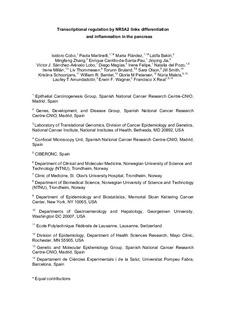Transcriptional regulation by NR5A2 links differentiation and inflammation in the pancreas
| dc.contributor.author | Cobo, Isidoro | |
| dc.contributor.author | Martinelli, Paola | |
| dc.contributor.author | Flández, Marta | |
| dc.contributor.author | Bakiri, Latifa | |
| dc.contributor.author | Zhang, Mingfeng | |
| dc.contributor.author | Carrillo-de-Santa-Pau, Enrique | |
| dc.contributor.author | Jia, Jinping | |
| dc.contributor.author | Lobo, Víctor J. Sánchez-Arévalo | |
| dc.contributor.author | Megías, Diego | |
| dc.contributor.author | Felipe, Irene | |
| dc.contributor.author | del Pozo, Natalia | |
| dc.contributor.author | Millán, Irene | |
| dc.contributor.author | Thommesen, Liv | |
| dc.contributor.author | Bruland, Torunn | |
| dc.contributor.author | Olson, Sara H. | |
| dc.contributor.author | Smith, Jill | |
| dc.contributor.author | Schoonjans, Kristina | |
| dc.contributor.author | Bamlet, William R. | |
| dc.contributor.author | Petersen, Gloria M. | |
| dc.contributor.author | Malats, Núria | |
| dc.contributor.author | Amundadóttir, Laufey T. | |
| dc.contributor.author | Wagner, Erwin F. | |
| dc.contributor.author | Real, Francisco X. | |
| dc.date.accessioned | 2019-06-06T13:22:46Z | |
| dc.date.available | 2019-06-06T13:22:46Z | |
| dc.date.created | 2018-03-06T10:17:49Z | |
| dc.date.issued | 2018 | |
| dc.identifier.citation | Nature. 2018, 554 (7693), 533-537. | nb_NO |
| dc.identifier.issn | 0028-0836 | |
| dc.identifier.uri | http://hdl.handle.net/11250/2600199 | |
| dc.description.abstract | Chronic inflammation increases the risk of developing one of several types of cancer. Inflammatory responses are currently thought to be controlled by mechanisms that rely on transcriptional networks that are distinct from those involved in cell differentiation1,2,3. The orphan nuclear receptor NR5A2 participates in a wide variety of processes, including cholesterol and glucose metabolism in the liver, resolution of endoplasmic reticulum stress, intestinal glucocorticoid production, pancreatic development and acinar differentiation4,5,6,7,8. In genome-wide association studies9,10, single nucleotide polymorphisms in the vicinity of NR5A2 have previously been associated with the risk of pancreatic adenocarcinoma. In mice, Nr5a2 heterozygosity sensitizes the pancreas to damage, impairs regeneration and cooperates with mutant Kras in tumour progression11. Here, using a global transcriptomic analysis, we describe an epithelial-cell-autonomous basal pre-inflammatory state in the pancreas of Nr5a2+/− mice that is reminiscent of the early stages of pancreatitis-induced inflammation and is conserved in histologically normal human pancreases with reduced expression of NR5A2 mRNA. In Nr5a2+/−mice, NR5A2 undergoes a marked transcriptional switch, relocating from differentiation-specific to inflammatory genes and thereby promoting gene transcription that is dependent on the AP-1 transcription factor. Pancreatic deletion of Jun rescues the pre-inflammatory phenotype, as well as binding of NR5A2 to inflammatory gene promoters and the defective regenerative response to damage. These findings support the notion that, in the pancreas, the transcriptional networks involved in differentiation-specific functions also suppress inflammatory programmes. Under conditions of genetic or environmental constraint, these networks can be subverted to foster inflammation. | nb_NO |
| dc.language.iso | eng | nb_NO |
| dc.publisher | Nature Research | nb_NO |
| dc.title | Transcriptional regulation by NR5A2 links differentiation and inflammation in the pancreas | nb_NO |
| dc.type | Journal article | nb_NO |
| dc.type | Peer reviewed | nb_NO |
| dc.description.version | acceptedVersion | nb_NO |
| dc.source.pagenumber | 533-537 | nb_NO |
| dc.source.volume | 554 | nb_NO |
| dc.source.journal | Nature | nb_NO |
| dc.source.issue | 7693 | nb_NO |
| dc.identifier.doi | 10.1038/nature25751 | |
| dc.identifier.cristin | 1570738 | |
| dc.description.localcode | This is a post-peer-review, pre-copyedit version of an article published in [Nature]. The final authenticated version is available online at: https://doi.org/10.1038/nature25751 | nb_NO |
| cristin.unitcode | 194,66,40,0 | |
| cristin.unitcode | 194,65,15,0 | |
| cristin.unitname | Institutt for bioingeniørfag | |
| cristin.unitname | Institutt for klinisk og molekylær medisin | |
| cristin.ispublished | true | |
| cristin.fulltext | original | |
| cristin.qualitycode | 2A |
Files in this item
This item appears in the following Collection(s)
-
Institutt for bioingeniørfag [184]
-
Institutt for klinisk og molekylær medisin [3426]
-
Publikasjoner fra CRIStin - NTNU [37177]
-
St. Olavs hospital [2440]
